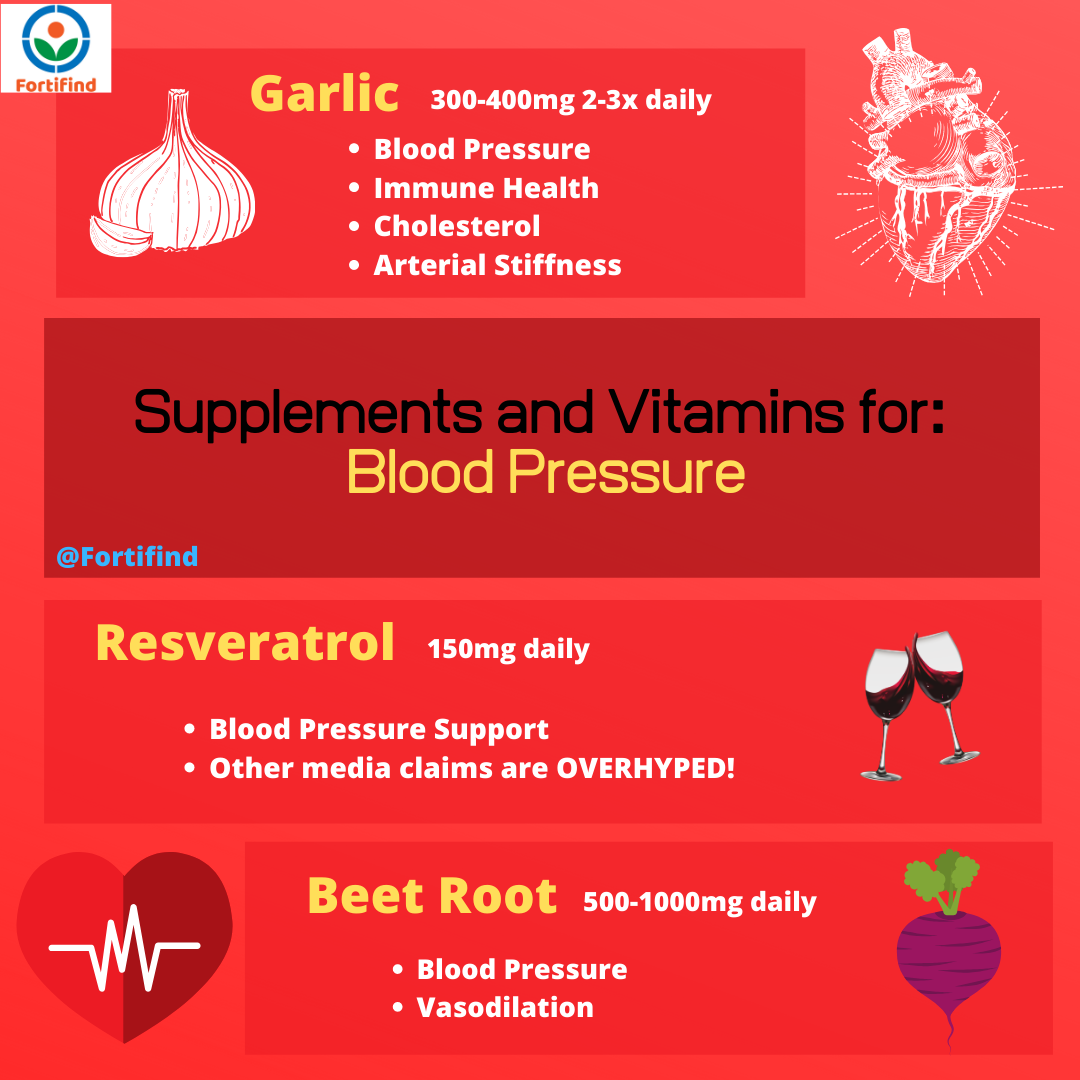Can Supplements and Vitamins help with High Blood Pressure?
Written and Clinically Verified by: Matt Marshall, PharmD.
Are we too quick to turn to prescription medications as the solution for our health problems? While modern medicine is effective, it’s not without caveats like these:
- Rising costs of prescriptions
- Side effects
- Drug interactions
All are things we have to consider before taking ourselves out of the equation and letting drugs do all the heavy lifting for our health.
What other options do we have then? As any doctor will tell you, lifestyle intervention in the form of losing weight, taking up exercise, or cleaning up your diet are the mainstays of the new hot topic in western healthcare – Preventative Medicine.
But here is what the doctor is not telling you – there are readily available over the counter vitamins and supplements to help you with those interventions. Being a medical professional professional myself, I’m often asked why these products aren’t discussed more often in the doctor’s office.
The answer is actually pretty simple – There’s evidence to show their benefit; we just aren’t taught very much about them in school or in practice.
The below graphic summarizes the best supplements and vitamins for people concerned with high blood pressure. Read on as we take a more thorough look at each, and feel free to save the graphic and share it around if you find it helpful!

Supplements for Blood Pressure
Fun fact: supplements that lower blood pressure actually don’t work on the heart directly.
Instead, these supplements help the blood vessels in the body relax, allowing enhanced blood flow.
Think of it like blowing air through a straw. The smaller the straw, the more effort it takes to blow air through it. Dilated (larger) blood vessels means the heart doesn’t have to generate as much pressure to move blood through the body, thus lowering your blood pressure.
Just be cautious if you are taking medications to lower your blood pressure already, as it is possible to lower your blood pressure too much!
When this happens it’s called hypotension, and you can experience symptoms such as lightheadedness, fatigue, and dizziness.
Beet Root
Beet root is naturally dense with nitrates, meaning that it provides a boost to nitric oxide levels in the body – a key component in promoting endothelial (blood vessel) relaxation.
Best of all it’s cheap and highly effective.
Get it in capsule or powder form and take it daily for best effects on blood pressure.
How to take: Target dose will be 500-1000mg daily, or 1-2 scoops if using the powder version. If you are diagnosed with any existing heart conditions, start with half the recommended dose to assess tolerance.
Garlic
Garlic provides outstanding benefits to overall health for the heart and the circulation. It’s absolutely recommended for anyone with current or past heart disease, and for anyone with a family history of heart disease.
Like beet root, it indirectly helps the heart by helping the blood vessels, albeit through a slightly different mechanism.
Something else that’s notable about garlic is its apparent ability to enhance the power of your immune system, making it extremely ideal to take around flu season (October through May), or if you’d just like to avoid getting sick (which is probably all of us!)
How to take: 300-400mg taken twice to three times daily.
Resveratrol
Resveratrol received plenty of media attention years ago to the tune of largely exaggerated health claims. It does, however, have a modest effect on blood pressure.
As a supplement it’s ideal for mild blood pressure support if you are concerned about heart health or high blood pressure.
Be cautious if you exercise consistently while taking this supplement, as it may dampen some of the cardiovascular benefits of your exercise.
How to take: 150mg once daily.
To help save you some time, we’ve researched the best brands on the market for the supplements discussed above. Below you will find the links to each product – feel free to check them out and compare with your own research! We receive a small kickback (about 5%) from Amazon, not the brand, which means that we can not only continue to produce high quality content, but keep our recommendations 100% free of bias as well. If you would like to receive a list of supplement suggestions tailored to you personally, please consider taking our Supplement Quiz (on the home page). It uses an extremely thorough list of questions for each category to narrow down exactly what could be useful for you.
We strive to make our supplement articles concise, but accurate and true to the scientific evidence that’s available. These articles are reviewed and revised frequently to ensure that we remain up to date, our suggestions stay credible, and that you, our reader, receive only the best and most applicable information available. And because we always show our work – check out the references section below to see which studies we analyzed.
If you have any specific requests for an article you’d like to see me write, email Fortifind@gmail.com and let me know!
References:
Beet Root
- https://www.ncbi.nlm.nih.gov/pubmed/22882425
- https://www.ncbi.nlm.nih.gov/pubmed/23370859
- https://www.ncbi.nlm.nih.gov/pubmed/21071588
- https://www.ncbi.nlm.nih.gov/pubmed/29141968
Garlic
- https://www.ncbi.nlm.nih.gov/pubmed/23590705
- https://www.ncbi.nlm.nih.gov/pubmed/20958974
- https://www.ncbi.nlm.nih.gov/pubmed/15475033
- https://www.ncbi.nlm.nih.gov/pubmed/19060427
- https://www.ncbi.nlm.nih.gov/pubmed/9355906
- https://www.ncbi.nlm.nih.gov/pubmed/11697022
- https://www.ncbi.nlm.nih.gov/pubmed/22280901
- https://www.ncbi.nlm.nih.gov/pubmed/11697022
- https://www.ncbi.nlm.nih.gov/pubmed/15475033
- https://www.ncbi.nlm.nih.gov/pubmed/9355906
Reservatrol
- https://www.ncbi.nlm.nih.gov/pubmed/22055504
- https://www.ncbi.nlm.nih.gov/pubmed/25211703
- http://jp.physoc.org/content/early/2013/07/19/jphysiol.2013.258061.abstract
Photo by Jon Tyson on Unsplash










